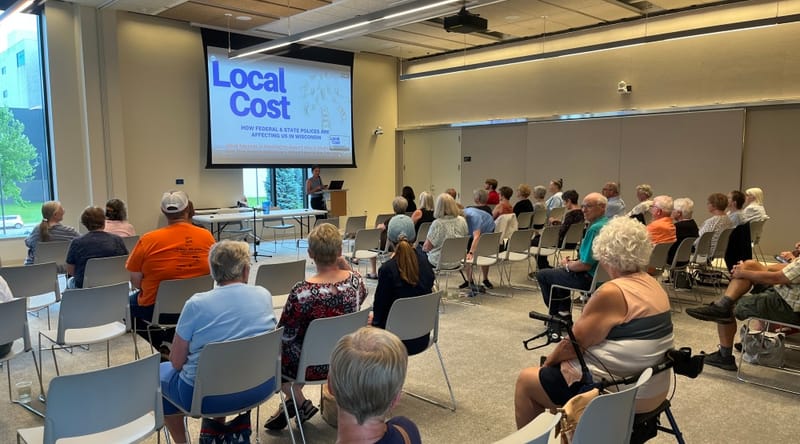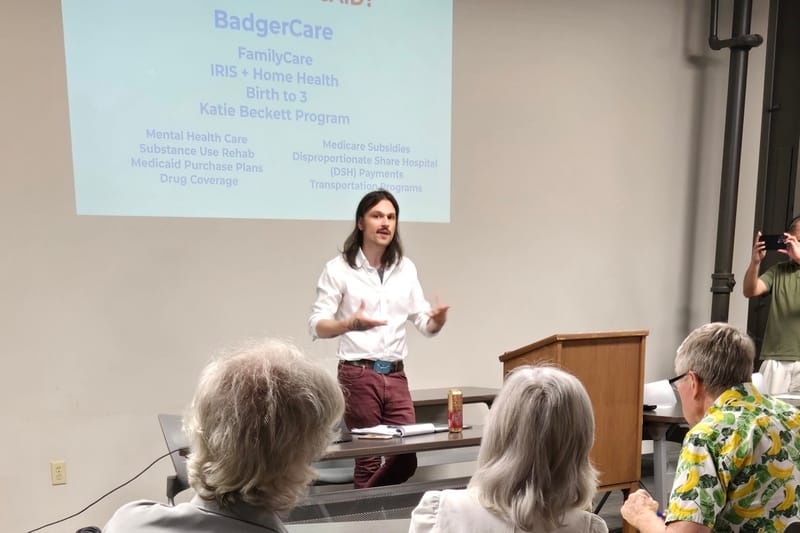Charlotte and Amelia: How Medicaid has helped a family dealing with autism survive
'We would love to give them some skills to allow them to better act in the community. You know, everyone wants to communicate and have their needs met. Everyone wants to be able to, like, go to a movie or go to a birthday party.'

When it comes to the Sanders household, it really does take a village.
Take away that village – or any one of its constituents – and the situation becomes untenable in so many ways. Take away goddaughter Madison and her contributions to the care of her nieces, and the scaffolding of the Sanders’ lives begins to teeter. Take away brother Daniel and the sacrifices he lovingly makes and the emotional cohesion of the family starts to fray.
Take away the attentions of Oceannana of Christian Servants, a respite provider who five days a week takes care of Charlotte and Amelia so that their parents, Ben and Amy, can see to the necessary requirements of running a family; or remove Brooke, Allison and Sydney of Innovative Growth, the young women who come twice a week to help the girls with physical activity that allows them to learn to “regulate;” and the Sanders’ world is very different from what it is today.
Remove any of that and either Ben or Amy, parents of profoundly autistic 10-year-old twins Charlotte and Amelia, would have to give up their jobs that are necessary to provide the ongoing and overwhelmingly involved support their daughters require.
Even without the financial demands, the burdens of being parents of children so far along the spectrum are unimaginable for parents of neurotypical children or even parents of children whose autism is more manageable. Both are non-verbal and both can be volatile and difficult to monitor, meaning they require nearly constant observation. They can and have wandered off or climbed the fence. They need ushering to and from school and that means all the way into the school and all the way into the house at the end of the day.
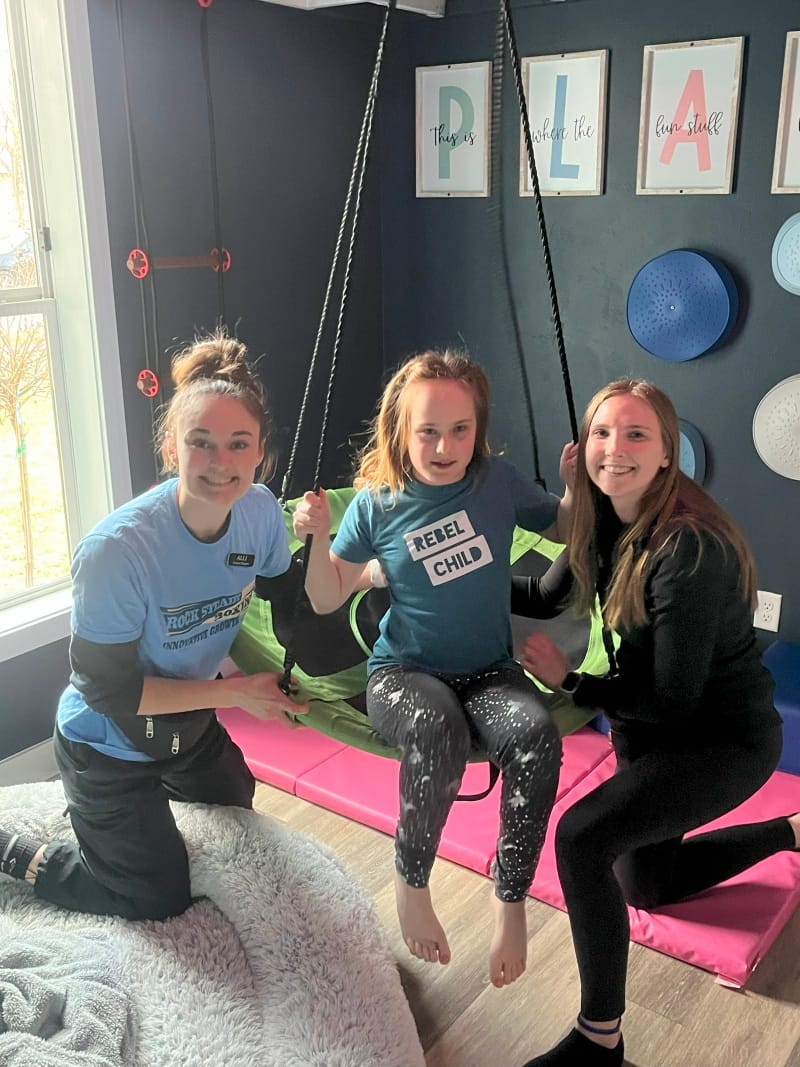
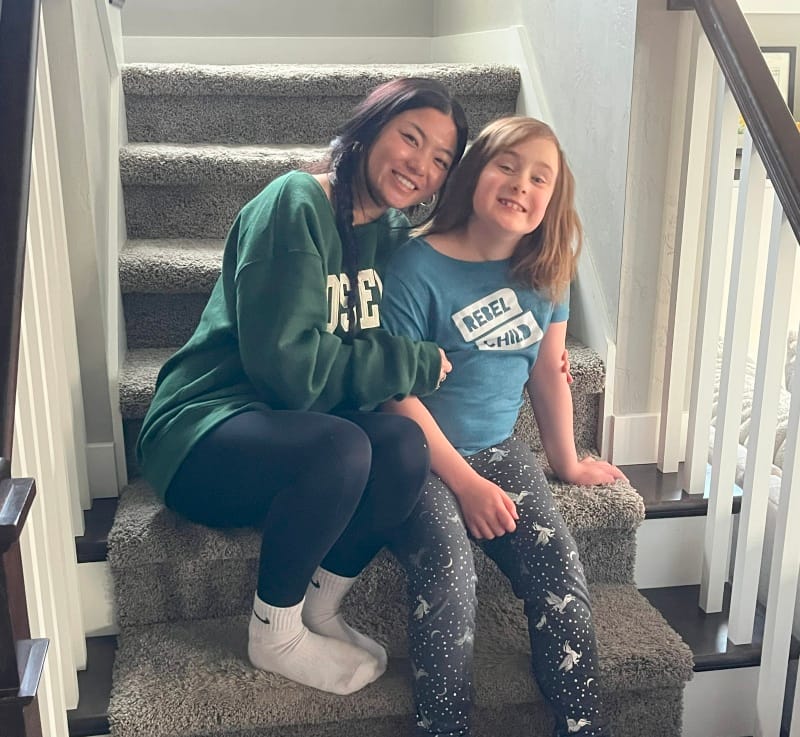



“Kids with autism struggle to feel calm in their own bodies,” Amy says. “And they don’t know their bodies in space and their nervous system is sending them fight or flight signals and so they express themselves differently. Charlotte can be very aggressive and Amelia can just go around clearing tables and being almost manic. It’s the dysregulation associated with autism.”
Then, too, there is the emotional confusion and adaptation for parents whose children do not display the same affects as neurotypical children. That includes expressions or intimations of affection or the type of stimulus-response that a parent expects as their children begin to develop. These things are overwhelming but are nothing a parents’ love doesn’t supersede or overcome.
But for children like Charlotte and Amelia to live their best lives, to thrive to the full extent they can, they need programs like Birth to Three, Katie Beckett (insurance for the disabled people 18 and under that has no income thresholds), Children’s Long Term Support and special needs programs provided by the Department of Education, among so much else.
“We would love to give them some skills to allow them to better act in the community,” Amy says. “You know, everyone wants to communicate and have their needs met. Everyone wants to be able to, like, go to a movie or go to a birthday party.
“Honestly, we’d be devastated without (all this support).”
Medicaid Under Attack
Almost all of the revenue to support that vital assistance is under siege since President Trump took office in January. He began an immediate campaign to fulfill the promises in The Heritage Foundation’s Project 2025, a document that Trump feigned ignorance of on the campaign trail but appears to have had aims of implementing all along. Among the most drastic planks of Project 2025 are deep cuts to the social safety net, including Medicaid, as well as the elimination of the Department of Education, which helps fund state education budgets, including, vitally for the Sanders, special ed. That department also enforces the Individuals with Disabilities Act and provides for IEP’s, or a qualifying child’s individual education plan.
All of this government funding merely provides for Charlotte and Amelia until they turn 18. Their needs won’t stop then, nor will the need for the financial support to supply them.
Sydney and Allison of Innovative Growth
“Strike me down if I’m wrong and I would love to be wrong about this but I think just based on their trajectory and their current behaviors and what appears to be their developmental capability, I would say, no, they will never live on their own,” says Ben. “They’ll probably live with us until we are retirement age or later and by then I’m hoping there will be a nice community home they can transition to that will assist them with all of their needs.”
That, too, of course, will require Medicaid assistance.
Ben and Amy, who are on the Appleton Special Education Parent Advisory Council, are grateful that Appleton is so mindful of the needs of families like theirs. Yet there’s only so much that can be done when special education is currently funded at somewhere between 26 to 30 percent of the district’s outlays and when the school district itself is $12 million in the hole.
The speech and language, physical and occupational therapy Charlotte and Amelia so critically received are made possible through special ed. They say there is just no way of knowing what gets impacted if the Department of Education shuts down nor what oversight for special ed programs would look like were that to happen.
While the Republicans insist they have no plans to cut Medicaid, the Energy and Commerce Committee is charged in the GOP budget bill with finding $880 billion in cuts and the only way that happens is via Medicaid.
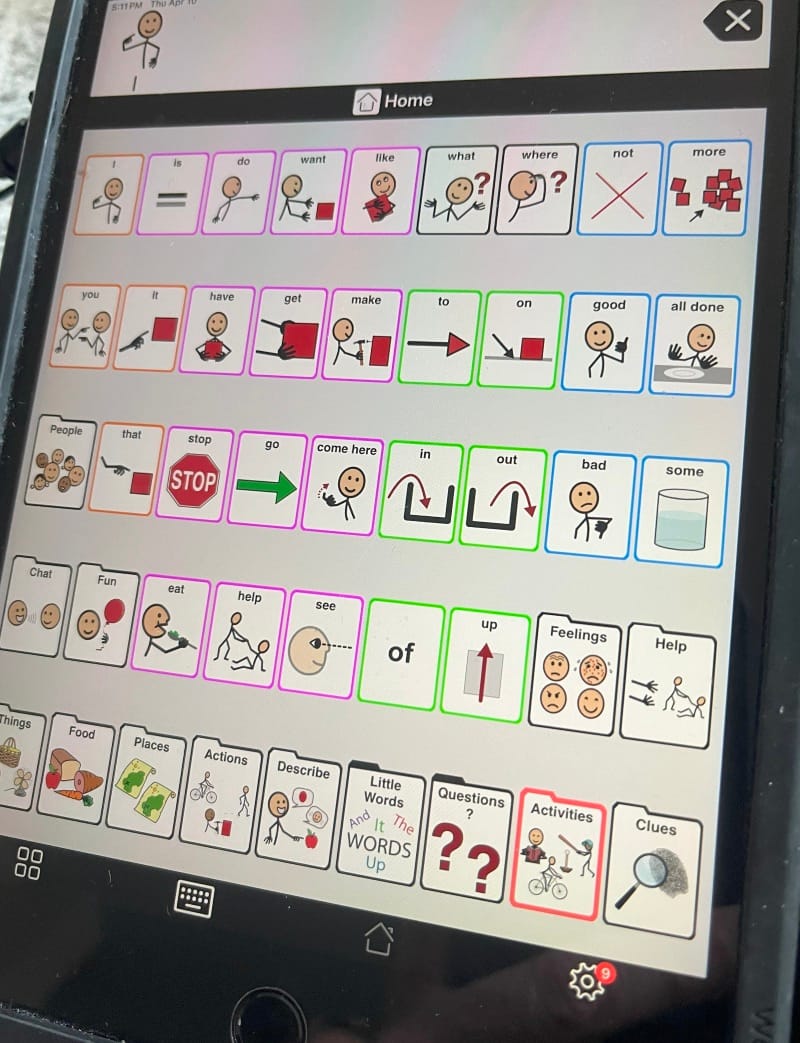
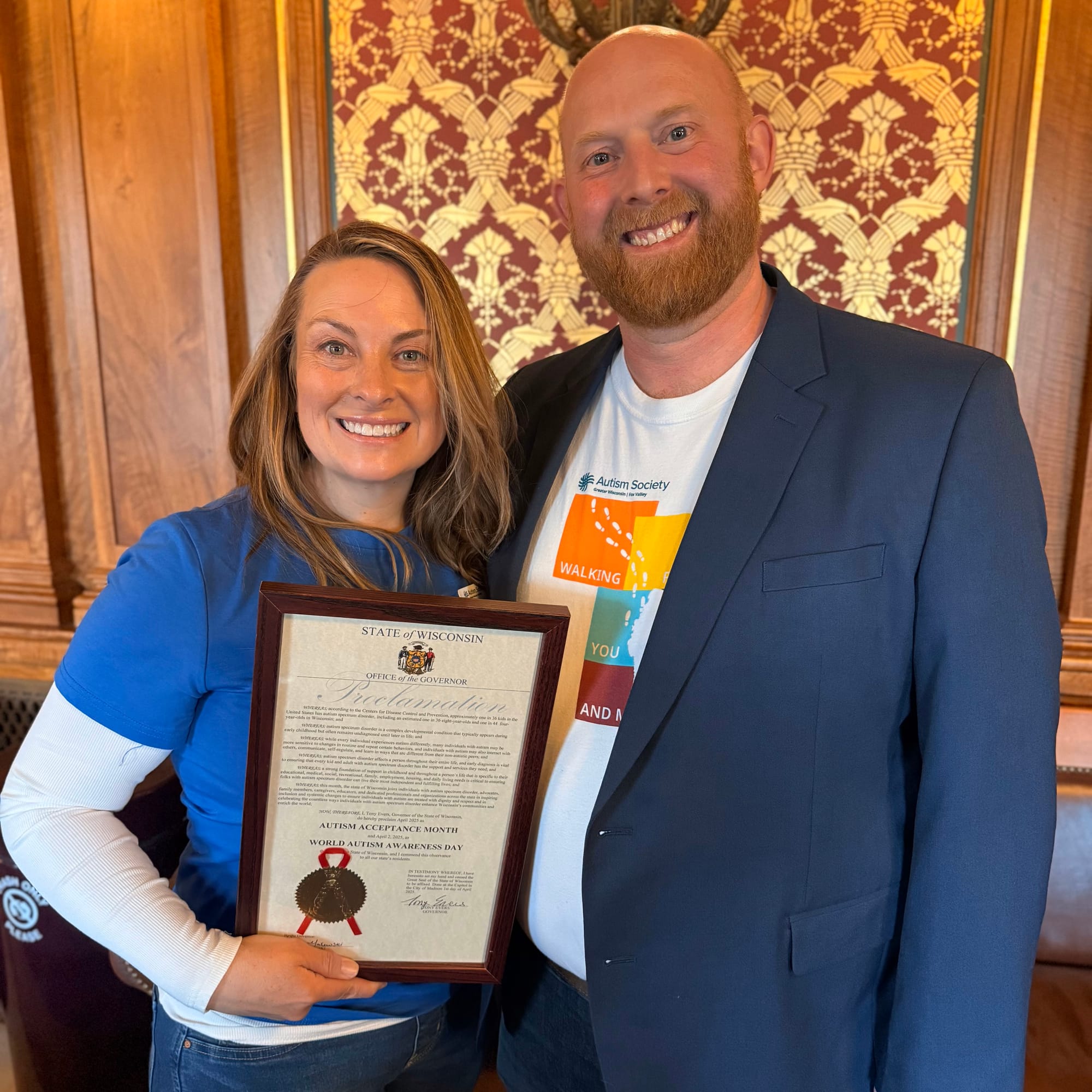
Left: A talking aid, which costs $7,000 and is covered by Medicaid, allows Charlotte and Amelia to express themselves; Right: Amy and Ben receive Gov. Evers' Autism Awareness Month Proclamation earlier this month.
Another invaluable tool the Sanders use is the talker that allows the girls communicate their needs. That device, which looks like an I-Pad but with icons that represent a host of images, words and feelings costs $7,000 and is funded through Medicaid.
“That has been a game-changer,” Amy says.
Amy also estimates that early Applied Behavioral Analysis therapy, which was so important in reinforcing desired behavior from Charlotte and Amelia, cost upward of $100,000 a year.
‘We’re going to do everything in our power …’
Beyond the essential needs Medicaid provides are the intangibles that allow the Sanders to approximate a normal family home. Daniel, their 14-year-old son is active in sports and has been able to get away for vacations or to baseball games, things that would not be possible without the assistance of people like Oceannana, or Oshi, as she is called. Oshi comes every day after school and stays until the girls’ bedtime.
“It allows Daniel to get one-on-one attention from us,” Amy says. “He could not be here sitting and talking with us right now without Oshi. Ben couldn’t have coached Daniel’s football team last year. Oshi has been an absolute blessing.”

Oshi’s presence in their life also allows Amy and Ben to be active advocates for their daughters and for autism in general. Even with her, Amy says it’s a challenge to attend the meetings and conferences of the Autism Society Board of which they are prominent members.
Amy will receive a special citation for her advocacy work from Appleton mayor Jake Woodford later this month. She and Ben were on hand in Madison earlier this month to receive Gov. Evers' proclamation of April as Autism Awareness Month on behalf of The Autism Society of Fox Valley, where Amy is a board member. Amy is also involved with WiFLI, or the Wisconsin Family Leadership Institute, which helps train families on the art of advocacy.
Ben talks about the economic impacts of cuts to Medicaid. He accepts that there are a lot of people out there who either don’t understand how many people are impacted by the program (1.2 million people or one in four in Wisconsin are enrolled) or don’t know the ways it impacts them. And even for some who do, they fundamentally don’t believe government should be playing such a role. But he thinks those folks are unaware of just how many businesses in the local economy would be severely affected if Medicaid and other government assistance programs end up on the chopping block.
“Take away the moral issue,” he says. “Oshi would be out of a job because Christian Servants might no longer exist. That’s nearly 100 employees. Innovative Growth employs a bunch of people and they have a special needs gym down on College that has trampolines and swings and a zip line and now that’s probably gone.
“You can look up all the companies in the state that take CLT waivers. There are companies that exist to make improvements to houses for special needs children and safety product companies and flooring companies. There are a multitude of therapy places and we might have to stop going to specialists. So it’s far greater than people realize.”
Innovative Growth, for instance, founded by Brook Penoske, one of the Sanders girls’ helpers, around 15 therapists. Almost every bit of their revenue comes via Medicaid or Children’s Long Term Support.
Amy points out that Ben would have to quit his job as Vice President of Valley Planing Mill and what that would mean not only for family income needed to help support the girls, but lost tax revenue for society.
The long-term goal is to make Charlotte and Amelia as independent as possible and maybe even develop them to the point they are employable. Ideally, they would be able to live in an established home for people with profound autism.
“We want to make sure we leave this planet with the girls being able to be taken care of and not have Daniel sacrifice his life goals,” Ben says. “So he can just be a brother and not have to take care of this and that and worry about these day-to-day things. That he could be a parent and have kids of his own and a family and this isn’t a constant burden on him.
“We’re going to do everything in our power to make that happen.”




